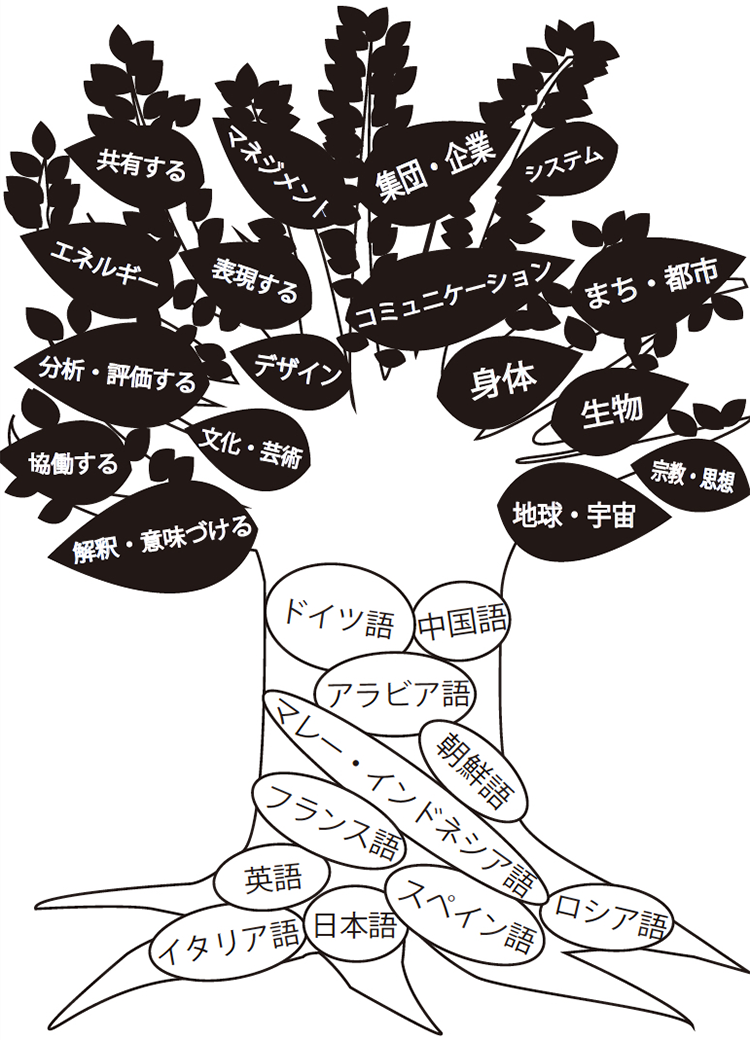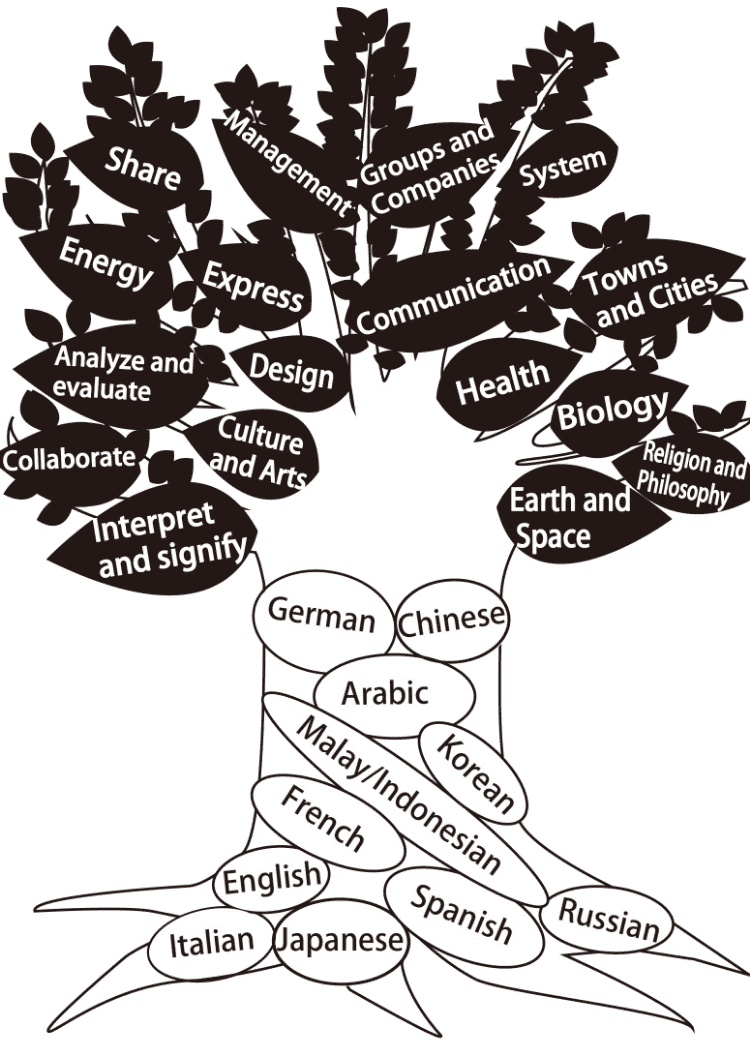SFC言語教育の理念SFC’s approach to language education
言語の学習は視野を広げる窓
言語を勉強することは、SFCにおいてキャンパス開設当初より「窓」にたとえられてきました。言語が異なれば、表現方法も思考も異なります。そこには価値観・世界観の違いが伴います。ひとつの窓から眺める星空は小さくても、窓の数が多くなればなるほど、窓が大きくなればなるほど、見える世界は広く大きく拡がっていきます。言語は、その窓と同じです。母語だけで見ていた世界は、多言語の窓から見た世界とは驚くほど異なるのです。みなさんの多くは、英語をすでに言語として学んできたと思います。学校での英語の授業科目以外にも、好きな音楽や映画を英語で見たり聞いたりした経験を持つ人は多いでしょう。でも、それでグローバルな世界が見えたと思っていませんか?これは1つの窓に過ぎません。これで天空全体を見渡すことはできません。でも、この窓を足がかりにして、別の窓を開けることができます。これが、SFCでみなさんが学ぶ言語の意味です。ヨーロッパ言語でも、アジア言語でも、新たな言語をもう一つ学ぶことで、これまで知らなかった価値観・世界観に遭遇することでしょう。この学びのプロセスが、自分がこれまで捉えてきた視野を広げることだけでなく、自分の母語、そして自分の思考自体を、相対化することにつながります。
新たな言語への挑戦こそが自分の世界を変える!
慶應義塾大学SFCでは、みなさんが学習できる言語を11言語揃えています。学部を問わず全員が必ず言語コミュニケーション科目を履修します。SFCで学生が自分の研究をおこなう上で、誰もが必要とする基礎です。ここで特筆すべきことは、この言語教育が教養という名でおこなわれる知識レベルの科目ではなく、自己を発信できる運用能力を身につけることを学習目標とした実践的科目群であり、体系化されたコースを全語種が共通して構築していることです。例えばヨーロッパ言語の場合、学部1年生で初めて学ぶ言語をインテンシブコース(週4回集中コース)で3学期間(1年半)勉強すると、2年生時には、基礎的な自己発信能力が身につきます。自己発信能力とは、自分が誰で、自分が何をおこない、何を考えているのか、母語で説明するのと同じように、学習言語でも発信できる能力を指します。だからこそ、新たな言語を勉強することで、みなさんが既に学習してきた英語と相対化しながら、英語の学び返しをおこなうこともできるでしょう。
言語習得なくして研究はできない!
そして何よりも重要なことは、自分の研究につながる言語を学習言語に選ぶことです。研究分野や活動フィールドによって、必ず必要になってくる言語があるはずです。SFCは分野横断的に自分の研究テーマを設定できるキャンパスです。自分で問題提起をおこない、解決するプロセスの中で、そのための手法が必要となります。言語習得は、そのときの大切な自分の手法になります。研究対象を間接的にではなく、直接、現地の言語で情報収集できる、現地でのインタヴュー調査ができる、研究を実行するための大切な手段です。ところが、言語習得は一朝一夕に獲得できるものではありません。だからこそ、できるだけ早い時期に履修を始めることをお勧めします。学習言語を決めることは、自分のその後の研究活動の方向性にも密接に関連してきます。好きなことが研究対象として勉強できるSFCだからこそ、そのための手法は自分で考え、関連付けて履修していくことがとても大事です。
世界に輩出する人材の育成

SFCの多言語教育は、キャンパス開設以来担ってきた言語政策が重要な意味を持ちます。特にマレー・インドネシア語やアラビア語など、重要な言語であるにもかかわらず、国内の教育機関では学習の機会がきわめて少ない言語がインテンシブコースでしっかり学べる環境は、総合大学として他に例を見ない特徴です。しかも、当然のことながら知識構築型ではなく、実践的な運用能力の習得を目指します。加えて、現在では日本語を母語としない学習者のための、学習言語としての「日本語」も他の言語と共通の体系的なコース設置をおこない、多様なレベルに柔軟に対応できる言語教育をおこなっています。既習言語の英語については、言語コミュニケーション科目のみならず、一般科目でも一部は英語で開講されています(注1)ので、複数の言語を並行して学べる充実した学習環境が用意されています。(注1:英語以外の言語で開講されている一般科目もあります。)SFCの言語教育は、世界中で活躍する多様な分野のリーダー輩出につながっています。これは、言語教育が多様な研究分野と結びついた形で習得されることを意味するだけでなく、SFCにおいて積み重ねてきた多言語教育が人材育成の場として機能していることを示すものです。新入生のみなさんには、ぜひこの素晴らしい学習環境を存分に活かした学習計画を立てることをお勧めします。
みなさんの学ぶ言語の選択が、これから取り組む自分の研究の強力な手段となるように、そしてみなさんの「窓」が広く大きく開くように、いっしょに邁進していきましょう!
Language learning as a window to broaden your horizons
Studying a language has been viewed as a "window" at SFC since the campus was first opened. Different languages have different ways of expression and thought. This is accompanied by differences in the values and outlook on the world. The view of the starry sky from a single window may be small, however, the more windows there are, and the larger each window becomes, the wider and broader one's view of the world becomes. Language is like that window. A world viewed solely in one's native language is remarkably different from the world seen through a multilingual window. We assume that many of you have studied English as your first foreign language. In addition to the English classes at school, you have probably watched or listened to your favorite music or movies in English. Nevertheless, do you honestly believe that you have seen everything the world has to offer through this one window? You cannot see the entire sky through just one window. However, this one window can be used as a stepping stone to open another. This is the true meaning of learning a language at SFC. Whether it is a European or Asian language, by learning another new language, you will encounter values and worldviews that you have never known before. This learning process will not only broaden your perspective but will also lead you to better understanding the place your native language and perhaps your thinking holds in this world.
Tackling a new language can change one's world!
At SFC, there are 11 languages available for you to study. All students, regardless of your department, must take a language communication course, which is an essential foundation for all students to conduct their research here at SFC. It should be noted that the language communication courses are not just knowledge-level courses in the name of liberal arts, but a group of practical courses with the learning goal of acquiring skills to express oneself, and are systematized throughout all language courses. For example, first year-level students who choose to study a European language for the first time for three semesters (one and a half years) in an intensive course (four classes a week) will be able to acquire the ability to express oneself in that language by the time they are in their second year of study. We define the ability to express oneself as being able to explain who you are, what you do, and what you think, in the language you are learning, just as you would explain it in your native language. Therefore, by learning a new language, you can compare and contrast it with English and relearn the language from a different perspective.
One cannot conduct research without language acquisition!
Most importantly, choose a language that is connected to your research. Depending on your research field and activity area, there will always be a language that you will come to need. SFC is a campus where students can set their research themes across different fields. The process of raising an issue and finding a solution requires various methods to do so. Acquiring a different language will be an important method for you at that time. It is an important means to carry out your research in local languages during fieldwork, as it allows you to directly collect information and conduct interviews in that area. However, a new language is not something that can be acquired overnight. That is why we recommend that you start taking the courses as early as possible. Deciding on what language to learn is closely related to the direction of your subsequent research activities. Because SFC allows you to pursue your research interests, it is very important to consider the various methods and relevant language courses to achieve your research goals.
Developing world-class future leaders

SFC's multilingual education is a significant part of the language policy that has been in place since the opening of the campus A unique feature of SFC is that students are able to study Malay/Indonesian, Arabic, and other important languages that are rarely offered at Japanese institutions as intensive courses. Furthermore, the courses are not designed to just build knowledge, but rather to provide students with practical and real-world applicable skills. In addition, for students whose first language is not Japanese, we now offer systematic courses to learn Japanese alongside other language courses to provide language education that can be flexibly adapted to various levels. For students who have already studied English, not only language communication courses but also some general courses are offered in English (Note 1), providing a rich learning environment where students can study multiple languages at the same time. (Note 1: Some general courses are offered in languages other than English.) SFC's language education has led to the development of leaders in a variety of fields who are active around the world. This not only means that language education is acquired in a way that is linked to various fields of study, but it also demonstrates that the multilingual education accumulated at SFC functions as a platform for the development of future leaders. We encourage all new students to plan their studies to take full advantage of this wonderful learning environment.
Let's work together to ensure that your choice of language will be a powerful tool for your future research and that your "window" will swing wide open!